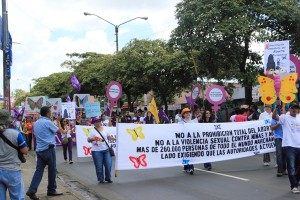
Women, girls, men and boys take to the streets in Nicaragua on the Day for the Decriminalization of Abortion in Latin America and the Caribbean (Photo Credit: Grace Gonzalez for Amnesty International).
What if she was your mother, your sister, or your friend? Would you tell her to press charges? Or would you tell her she should work things out with her husband in order to keep the family (including any children) together? In other words, would you want her to be safe, or remain in danger of further abuse and even death? I hope you would tell her to get out of there and call the police.
In Nicaragua, however, pressing charges may no longer be an option. Last year, Nicaragua passed Law 779, the Integral Law against Violence Against Women. One of its key provisions is that it does not allow mediation to replace criminal punishment of abusers. Tracy Robinson, the Inter-American Commission on Human Rights Rapporteur for Women’s Rights, called the law “an important step forward.”
Now, Amnesty International is warning that opponents of Law 779 may overturn this key provision on the ground that it “breaks up families” – as if growing up in a climate of violence is good for children. They want to allow mediation as an alternative to punishment in cases involving less than five years of jail time. Doing so will only contribute to a climate of impunity that tells abusive partners that their behavior is acceptable.